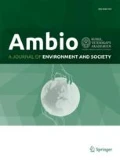Open Access
AMBIO has a unique position in the world of environmental science journals in that it is clearly aimed at linking the output of the scientific community with the wider public, and thereby influencing policy formulation. It is therefore of paramount importance that environmental research published in our journal can be easily accessed by a diverse readership around the world. AMBIO articles must be read, disseminated, and discussed so that important scientific results can be put into practice. A record number of almost 100 000 full-text articles were downloaded in 2011 but we must strive for even higher access.
One way to move forward is to make articles permanently and openly available on the Internet from the first day of publication. Open access subsidized by authors or research funds is increasingly becoming of greater importance to research institutions, to the general public, to researchers without institutional subscriptions, and not least to science itself. But it is also in the interest of authors themselves: the heightened visibility of their work to a larger audience leads to higher impact through more citations of their articles.Footnote 1
As Editor-in-Chief, I have regularly made especially noteworthy articles available with no charge paid by authors. Download rates dramatically increased as soon as these articles were made free access. Furthermore, the five most popular articles in terms of number of downloads in the preceding 90 days have also been made free access (courtesy of Springer). We will soon introduce a further option where you, as author, will have the choice whether you want to publish open access or not. Starting from June 1, 2012, AMBIO will shift from a traditional journal to a hybrid journal. In other words, should you so choose, you can make your article freely available indefinitely upon publication, in exchange for payment of a publication fee.Footnote 2
If you publish an article in the traditional way, without open access, all AMBIO articles are automatically made open access after 12 months from the day of publication via PubMed Central (starting January 1, 2010 but currently we are experiencing a backlog). You may also deposit your work on a personal or institutional online archive immediately after the article has been published on SpringerLink. However, you may not use the publisher’s PDF version, and a link must be inserted to the published article on Springer’s website.Footnote 3
Access to Older Volumes
Articles published in AMBIO have a very long “shelf life”, which is very encouraging indeed. Current download numbers for many articles published in the latest decade are strong and the 5-year impact factor continues to be high. Nevertheless, not all of you find it easy to retrieve these articles and I receive many requests for instructions on how to access older AMBIO volumes. For your convenience, relevant links for article download sites are provided in the footnote.Footnote 4
Open Call for Special Issues
On a regular basis, AMBIO publishes special issues on topical research themes. Normally two to three special issues are published every year. These special issues are widely appreciated by our readership and articles often become highly cited. During the last year we have published on themes such as climate policy, solar energy, integrated monitoring, and on changes in the Arctic. All proposals are evaluated by our editorial board and based on scientific soundness and interest we accept about half of all submitted proposals. We strongly encourage all research groups to submit thematic proposals for future special issues in AMBIO. Proposals are welcome at any time, but twice a year—1 April and 1 October—the editorial board will assess all submissions simultaneously. Publication fees for special issues will be very advantageous to authors, particularly for those articles that are made open access. An official announcement, including the minimum requirements for a special issue proposal, will be published on our website in June 2012.
The Review Process
Although there is strong agreement that peer review greatly helps scientific communication, (PRC 2008) there is room for improvement and to try new strategies to make it more effective. A majority of researchers prefers double-blind peer review, in which both authors and referees are anonymous, over other forms of review (PRC 2008). The main reasons are that double-blind peer review is perceived as more objective, removing potential biases due to the author’s institution or country, possible professional biases, etc. Although the jury is still out on deciding the virtues of double-blind peer review (e.g., Working double-blind 2008) AMBIO has decided to test it during 2012. We welcome your views on this temporary change. If you have—as an AMBIO author, reviewer or reader—any experience you want to share with us please send me an e-mail. We will review and follow-up at the beginning of 2013.
Another recent change is that AMBIO is included in a trial program of a new peer review service called Peerage of Science (Hettyey et al. 2012). Peerage of Science seeks to provide better peer review for all participants in scientific publishing. Authors can send manuscripts to be peer reviewed before submitting to a journal, and reviewers have personal incentives to provide high-quality feedback in timely manner on manuscripts they choose to review.
Notes
See for example: http://opcit.eprints.org/oacitation-biblio.html.
Visit http://www.springer.com/open+access/open+choice?SGWID=0-40359-0-0-0 for more detailed information of the Open Choice program.
Visit http://www.springer.com/open+access/authors+rights?SGWID=0-176704-12-683201-0 for more detailed information.
SpringerLink, years 2010– (vols. 39–): http://www.springer.com/environment/journal/13280 BioOne, years 2000–2011 (vols. 29–40): http://www.bioone.org/loi/ambi JSTOR, years 1972–1999 (vols. 1–28): http://www.jstor.org/action/showPublication?journalCode=ambio.
References
Hettyey, A., M. Griggio, M. Mann, S. Raveh, F.C. Schaedelin, K.E. Thonhauser, M. Thoß, W.F.D. van Dongen, et al. 2012. Peerage of science: Will it work? Trends in Ecology & Evolution 27: 189–190.
PRC, Publishing Research Consortium. 2008. Peer Review in Scholarly Journals. Bristol: Mark Ware Consulting. http://www.publishingresearch.net/PeerReview.htm.
Working double-blind. 2008. Editorial 7 February 2008. Nature 451: 605–606. doi:10.1038/451605b.
Author information
Authors and Affiliations
Corresponding author
Rights and permissions
About this article
Cite this article
Söderström, B. Increasing Access to Your Research Published in AMBIO . AMBIO 41, 325–326 (2012). https://doi.org/10.1007/s13280-012-0293-2
Published:
Issue Date:
DOI: https://doi.org/10.1007/s13280-012-0293-2

